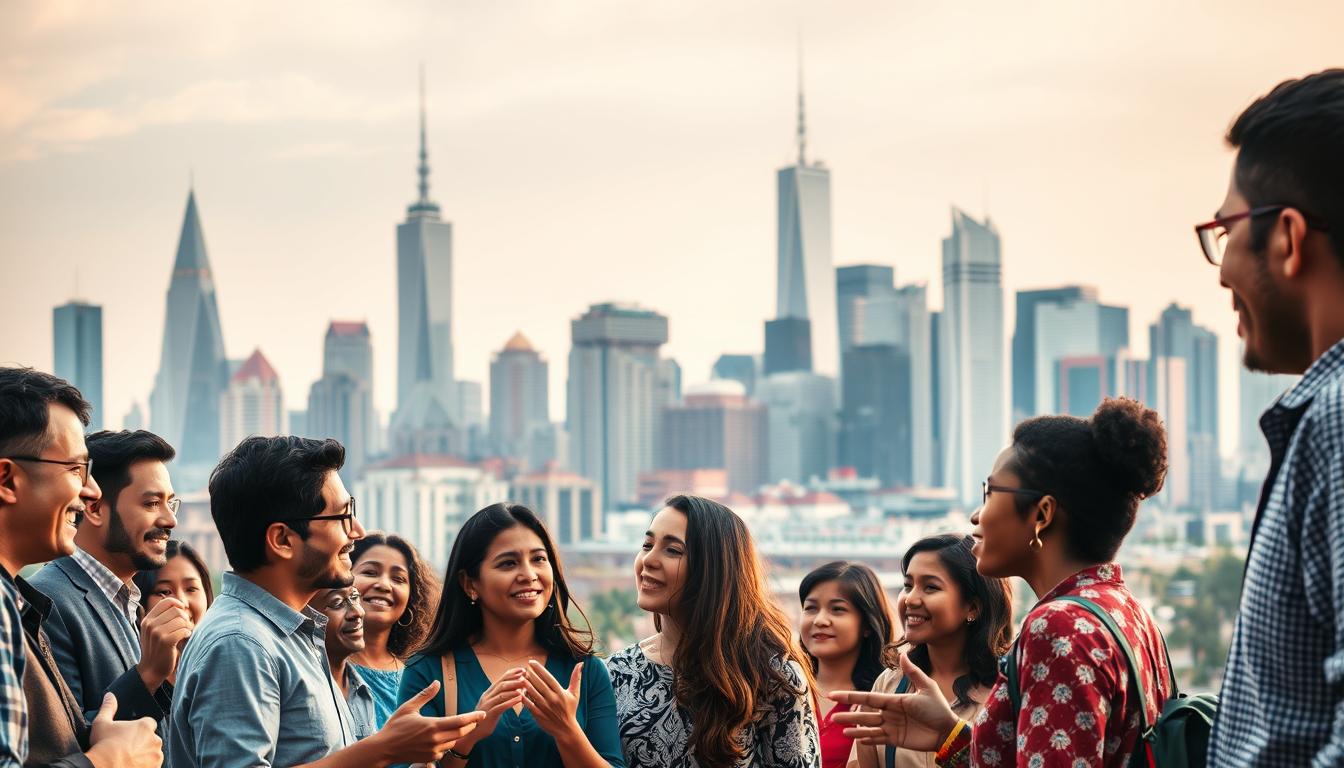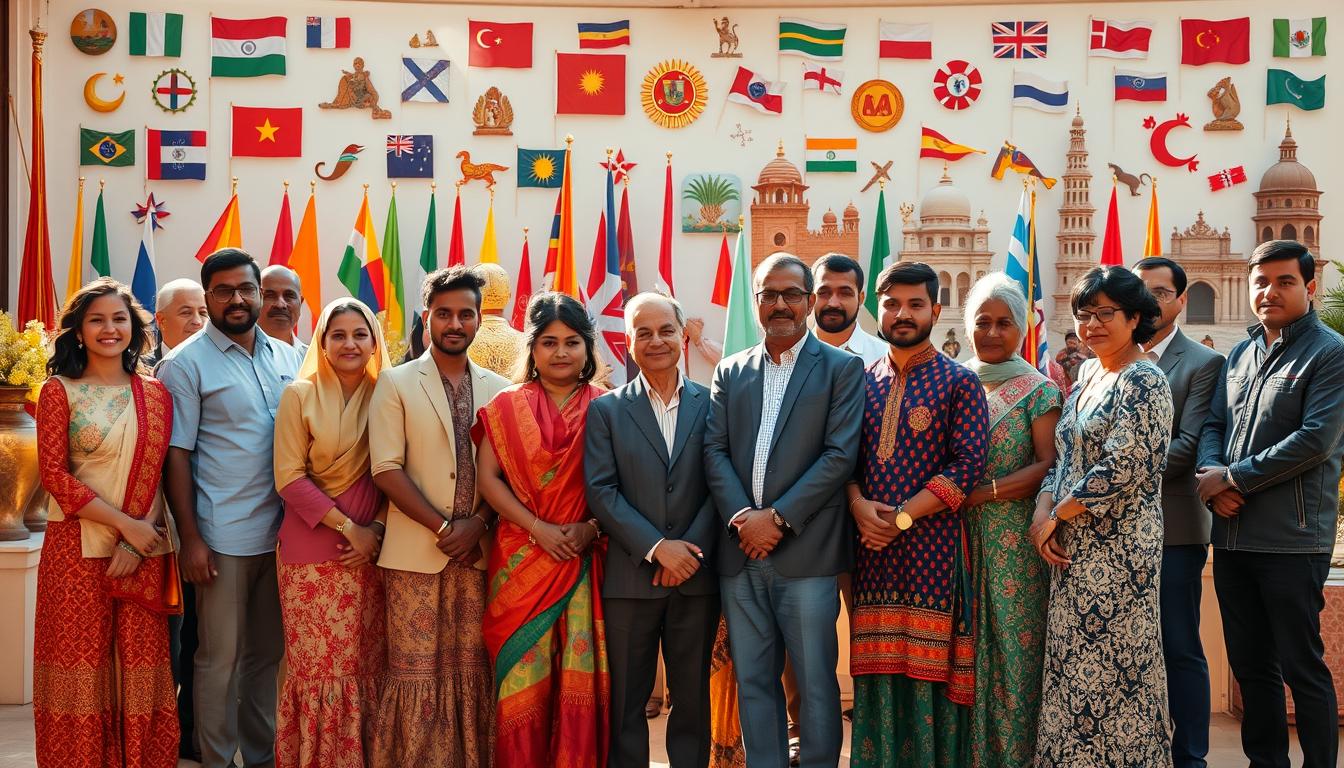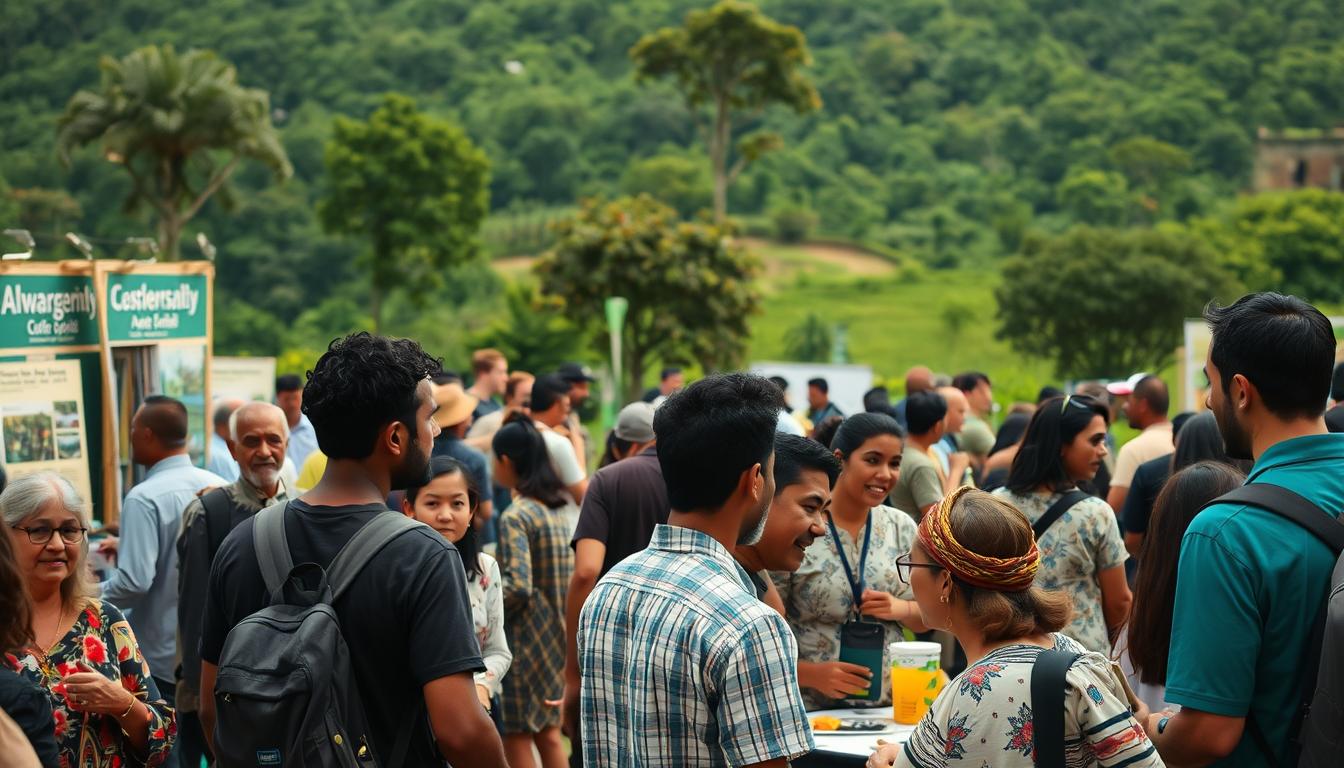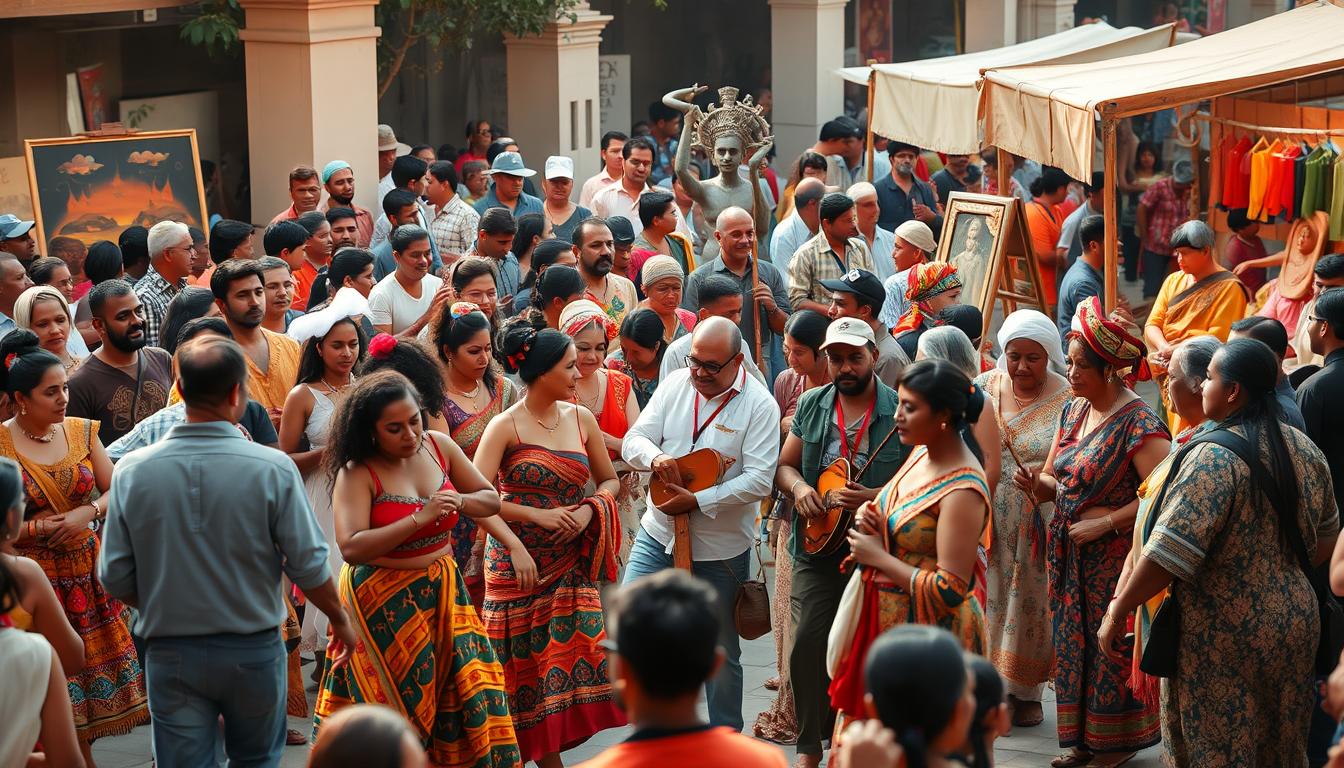Raising Global Awareness: Participating in International Cultural Dialogues
Anúncios
In today’s world, knowing about global issues is key. Cultural dialogues help us see different viewpoints and understand various cultures better. By joining these conversations, we become more aware of our place in the world. This helps us tackle big problems with empathy and knowledge.
Exploring different cultures makes our lives richer and our communities stronger. When we share our stories and traditions, we create a path for positive change. This is crucial in our complex world.
Understanding Global Awareness
Global awareness means knowing about the many issues affecting societies worldwide. It’s about understanding social, economic, environmental, and political challenges. This knowledge helps people become more informed and active citizens.
Definition of Global Awareness
Global awareness lets people see how international events and cultures are connected. It helps us understand how our actions affect others globally. This awareness is key for empathy and finding solutions together.
Importance in Today’s World
Global awareness is crucial today. It helps us tackle big issues like climate change, poverty, and inequality. It encourages us to work together, promoting cooperation over conflict.
The Impact of Cultural Dialogues
Engaging in cultural dialogues is key to social harmony and tackling diverse community issues. These talks help foster tolerance and understanding. They make our society more inclusive.
Fostering Tolerance and Understanding
Cultural dialogues let people share their stories and views. This helps build cultural understanding. It challenges our old beliefs, promoting tolerance.
Listening and learning from others creates respect. This reduces conflict.
Breaking Down Barriers
Cultural dialogues also help break down community barriers. These barriers come from bad communication, mistrust, and wrong information. They make global challenges worse.
Open talks can remove these barriers. This leads to working together on big issues. It makes our responses to society’s needs stronger.
Key Components of Effective Cultural Dialogue
Effective cultural dialogue needs key elements for understanding and teamwork. Active listening and valuing diverse views are crucial. These help in better communication across cultures and make dialogue more inclusive.
Active Listening Techniques
Active listening is a key skill in cultural dialogue. It means focusing fully on the speaker, getting their message, and responding well. Using techniques like:
- Paraphrasing to show you get it
- Acknowledging feelings and views
- Keeping eye contact and open body language
These methods help in open talk and make it safe for everyone to share.
Respect for Diverse Perspectives
Valuing different views is key in good cultural dialogue. Seeing that everyone has their own experiences and opinions makes the talk richer. This respect comes from:
- Letting everyone share their thoughts
- Accepting different opinions, even if they differ from yours
- Welcoming questions and clarifications
This kind of setting helps in understanding and empathy. It’s vital for better communication across cultures.
The Role of Technology in Promoting Global Awareness
Technology has made it easier to learn about the world through various platforms and tools. Social media is a key tool for connecting people from different cultures. It lets them share their stories and experiences.
Social Media as a Tool for Engagement
Social media connects people worldwide through many platforms. It encourages conversations about cultural diversity and global issues. This helps users understand different perspectives.
- Platforms like Facebook, Twitter, and Instagram let users share their stories instantly.
- People can join global campaigns to raise awareness about important issues.
- These networks are places where ideas are exchanged and voices are amplified.
Virtual Cultural Exchanges
Virtual cultural exchanges have changed how people from different backgrounds interact. They allow for collaboration, knowledge sharing, and discussions that build understanding.
- Virtual workshops and webinars bring together educators and students from various cultures.
- Online events promote storytelling, art, and collaboration across cultures.
- Participants learn about global challenges, broadening their understanding of the world.
Prominent Organizations Fostering Global Awareness
Many organizations work hard to raise global awareness. The United Nations is a key player, tackling big challenges and promoting cooperation. Nonprofits also play a big role, helping us understand different cultures and fight for justice.
United Nations Initiatives
The United Nations tackles big issues like poverty and environmental damage. They have the Sustainable Development Goals (SDGs) to guide countries. This plan helps countries work together to solve these problems.
Nonprofit Contributions
Nonprofits also do important work. They focus on cultural exchange, education, and saving the environment. Their efforts help us understand and support communities around the world, promoting inclusivity.
Education’s Role in Cultivating Global Awareness
Education is key in teaching students about the world. Schools help by adding cultural lessons to their classes. This way, students learn to work well together and respect different cultures.
Curriculum Integration in Schools
Adding global lessons to school makes learning better. Schools can do this by:
- Using books that show many viewpoints.
- Starting projects with students from other countries.
- Teaching about big global issues like saving the planet and fairness.
This helps students think globally and become better citizens.
Study Abroad Programs
Study abroad programs change students’ lives. They get to see how other cultures live. The benefits are:
- Learning new ways of teaching and learning.
- Practicing languages with people who speak them every day.
- Thinking critically in new cultural settings.
These experiences prepare students to be active and caring global citizens.
Effective Communication Strategies in Cultural Dialogues
Effective communication is key in building understanding and respect in cultural dialogues. It’s not just about words. It also includes the subtle messages sent through nonverbal communication. Knowing how these vary across cultures can make interactions better and create a welcoming space for everyone.
Nonverbal Communication
Nonverbal communication includes body language, facial expressions, and gestures. These can mean a lot in cross-cultural talks. For example, a simple gesture might have different meanings in different cultures. So, it’s important to be aware of these differences.
This knowledge helps people have better conversations and avoid misunderstandings by mistake.
Cultural Sensitivity in Conversations
Cultural sensitivity means being aware of the different ways people communicate. To have respectful and inclusive talks, you need to adjust how you communicate based on the other person’s culture. Here are some ways to be culturally sensitive:
- Researching cultural norms beforehand
- Listening actively and observing nonverbal cues
- Asking open-ended questions to encourage dialogue
- Being open to feedback and adjusting communication styles
Using these strategies can help make cultural exchanges more meaningful and respectful.
Strategies to Encourage Participation in Cultural Dialogues
Creating a space for cultural dialogues is key for community growth. It brings together different views, making experiences richer and understanding wider. Good strategies for community engagement and event planning lead to better cultural events.
Community Engagement Initiatives
Community engagement is vital for cultural dialogues. It brings people together, sharing their stories and learning from each other. Some ways to do this include:
- Collaborative workshops: Joint events where people explore topics from various cultures.
- Local exhibitions: Art and artifacts from different communities show appreciation for traditions.
- Cultural exchange programs: Hands-on experiences with different cultural practices build understanding.
Event Planning and Hosting
Good event planning is crucial for cultural events. It boosts participation in cultural dialogues. Important aspects for planning include:
- Identifying community needs: Knowing what cultural events locals want increases participation.
- Promoting inclusivity: Making events accessible and welcoming to everyone boosts engagement.
- Utilizing multiple platforms: Social media and local ads help reach more people.
The Influence of Global Awareness on Personal Growth
Getting involved in global awareness is key for personal growth. It lets people see different cultures and views. This helps them understand the big challenges our world faces today.
It opens up new paths for growth and makes life more interesting.
Expanding Worldviews
Meeting different cultures helps people see more. They learn from various traditions and ways of life. This expanding worldviews makes them see global events and issues in a new light.
It leads to smarter opinions and actions. Knowing about different cultures makes personal interactions better. It also helps in dealing with a world full of different cultures.
Enhancing Empathy and Compassion
When people hear about others’ stories, they grow more empathetic and compassionate. They start to feel a deeper connection with others. Talking about cultures helps them understand and feel for those facing global problems.
Evaluating the Outcomes of Cultural Dialogues
Measuring the success of cultural dialogues is key. It helps us see how these events affect people and communities. We use surveys to understand these impacts.
Measuring Success through Surveys
Surveys are great for getting feedback from those who take part. They help us see:
- How happy and involved participants feel
- How well they understand and accept different cultures
- Any shifts in their views of various cultural groups
With surveys, we can really get to know the effects of cultural dialogues. This helps us understand their impact better.
Long-term Benefits for Communities
Cultural dialogues have lasting effects. They bring communities closer together. This leads to:
- Stronger bonds among different cultural groups
- Better teamwork and unity
- More benefits for the community through shared experiences
These ongoing efforts help build a more united society. This is where real change happens.
Future Directions for Global Awareness Initiatives
As the world changes, global awareness efforts must keep up. They need to connect with people from all over. This means understanding and valuing different cultures and traditions.
By doing this, we can build a stronger sense of community. We can also foster empathy among people from different backgrounds.
Evolving Cultural Practices
Cultural practices need to change to fit today’s world. This means respecting old traditions and adding new ideas from global interactions. This blending helps us communicate better and understand each other more.
It creates a space for important conversations. These conversations can lead to big changes in society.
Adapting to a Globalized World
As the world gets smaller, we need new ways to share ideas. Using social media, virtual events, and online platforms can help. These tools make it easier to connect and share knowledge.
They keep our conversations fresh and let everyone contribute. Together, we can build a fairer world based on respect and understanding.
FAQ
What is global awareness?
How can cultural dialogues foster global citizenship?
What role does technology play in promoting global awareness?
Why is education important for cultivating global awareness?
How can communities encourage participation in cultural dialogues?
What are the long-term benefits of engaging in cultural dialogues?
How can individuals expand their worldviews through global awareness?
What strategies can be used for effective communication in cultural dialogues?
How do nonprofit organizations contribute to global awareness?
What future directions do global awareness initiatives need to take?
Published on: 5 de February de 2025

Luke Martin
Luke Martin, author of Credwallets.com, is a mathematics graduate with a specialization in financial markets. Known for his love of pets and his passion for sharing knowledge, Luke created the site to provide valuable insights into the complexities of the financial world. His approachable style and dedication to helping others make informed financial decisions make his work accessible to all, whether they're new to finance or seasoned investors.







